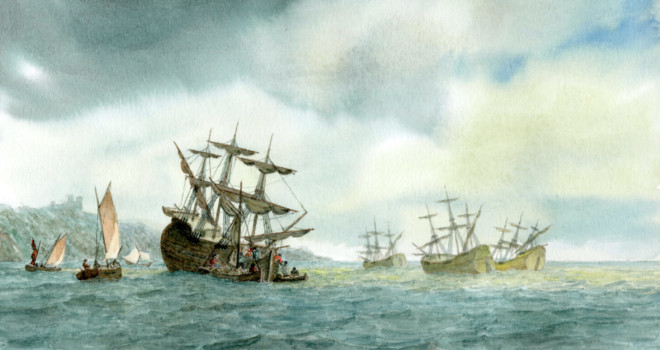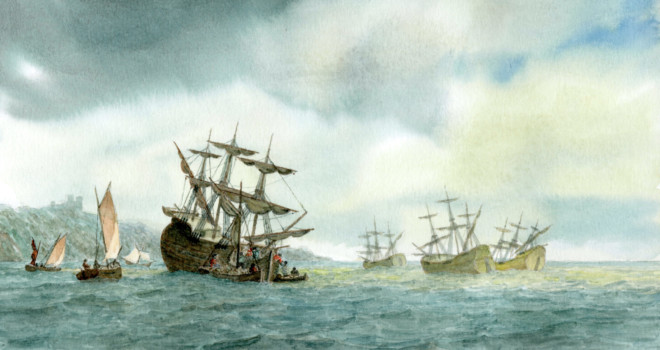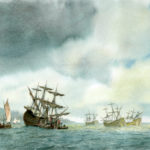Saint Francis Xavier was trapped on a rickety ship bound for Japan. His comrade lay on the brink of death, while the ship’s captain offered sacrifices to demons on deck, which would again tell the captain to abandon the voyage, break his oaths, and kill the Christians. The typhoons were coming, and pirates could be just over the horizon; there was no time left. What could he do? What could anyone do? Well, not only did he survive, but he and his companions all made it to the distant shores of Japan. How did he do it? He let us know, and there is much to learn from it!
Saint Francis, in his work ministering to the Portuguese colonies, wrote many letters. Through these letters it is clear to see how he handled adversity not only on that fateful voyage but throughout his life. He spoke truth with a bold humility, encouraged and strengthened his comrades, practiced what he preached, and ultimately conquered fear through his radical trust in God. By learning from and following his example we can do better on our own voyages, not to the shores of Japan, but to the gates of heaven. Let’s dive in!
Looking at his letters, it is impressive to see how he spoke the truth to everyone he encountered. Rather than grandstanding or demeaning though, he always couched his criticism in an earnest and humble desire to bring people to holiness. For example, when he first arrived in India, he found the Portuguese magistrates causing endless scandals. He swiftly spoke to anyone who would listen and even wrote the king of Portugal himself. In no uncertain terms he told him:
I would have your Highness give them the clearest possible warning, both that most certainly and assuredly you will accept no excuses whatever that may be alleged on this matter, and that no way remains to them of avoiding severe punishment and of finding favor with your Highness, except that of making as many Christians as possible in the places and during the time of their command… as long as the Governor and Commandants of your places in India are not pressed by that fear of losing their rank and property unless they have made many Christians, do not let your Highness hope for any great success in the preaching of the Gospel in the Indies.
He did not simply give practical advice however, but also explained what was at stake for the King himself, “May our Lord God grant to your Highness to understand most thoroughly and intimately, and to put in execution also at once, all that at the moment of your death you would rejoice to have done.”
This courage and charity in the face of authority pricked the consciences of many men and led to the changes that would help places like the Philippines become some of the most Catholic regions to this day.
On his voyage to Japan, he again practiced this virtue with his heathen boat captain, warning him against his idol worship and the price (both temporal and spiritual) he would pay should he betray his oath to take them to Japan. This bold and loving confrontation no doubt played a role in that captain refusing to kill them despite the urging of his idols.
Saint Francis did not only speak to those in authority. He had many Jesuits in his care, and he sought to provide them with constant counsel and consolation. From even the most remote and desolate places he visited he sent a flurry of letters around the world to them, exhorting them to holiness, humility, and bold action for the cause of Christ.
While he includes great advice in such quantities to fill its own book, an example is, “Before all things, devote your first and principal care to cleansing your own conscience and keeping it without stain… for how can a man be of use to others who takes no care for himself?”
He did not simply write letters, though; he always took care to practice what he preached. While he was often slow to speak of his own actions, those who journeyed with him marveled at his deeds. Not only did he baptize thousands of converts, but he made sure that every one of them was rigorously catechized. When people were abandoned, he would reach out to them, filling them with hope and providing for their needs. Few better examples can be seen than on that faithful voyage, where he prayed often, consoled his comrades, preached to the heathens, and actively saw to the proper execution of the voyage. So much so that he even noticed when the sailors tried to sail the wrong way and corrected them.
What cannot be glossed over are the immense perils he faced during his life. He suffered hunger, disease, exposure, persecution, and finally a martyrdom caused by betrayal and abandonment. How could he endure these horrors the devil threw at him? Here he has most excellent advice for us, for he says while on the very voyage itself:
It befell me, by the good gift of God, to feel and experience a great many things concerning the very great frights which the devil, when by God’s permission he has the power given him, is wont to inflict upon timid men exposed to danger, as well as concerning the means of defense which we ought to use in such a case and, at such a time against the assaults of the enemy… the devil can never hurt anyone at all, except as far as God Himself permits it: so that at such times we ought much rather to fear having any distrust in God, than to fear the assaults of our enemy… it is right that those who have a desire to serve God should take great pains in little matters, and lower themselves and empty themselves as much as possible, so that they may have an utter distrust of themselves, and an immense trust in God, and thus they may become accustomed, when great dangers of life or death or great trials present themselves, to have great hope in the goodness and mercy of God.
So it was, that by living a radical trust in God in all things, Saint Francis Xavier was able to cooperate with God’s grace and accomplish His will. All of the plots of his captain were scuttled, and a strong, persistent wind brought the ship to Japan, ahead of schedule.
While we will probably not find ourselves on a boat anytime soon, we are all certainly on a voyage. Not to the shores of Japan, but to the shores of heaven itself. Our countries’ leaders are no less likely to offer sacrifices to demons (abortion comes to mind) nor are the attacks and snares of the devil less present. We should, therefore, learn from Saint Francis and speak boldly to our leaders, consolingly to our peers, and always strive to practice the faith in matters small and great. Then, with trust and confidence in God, we too can be borne by His Will to our final destination!
✠












